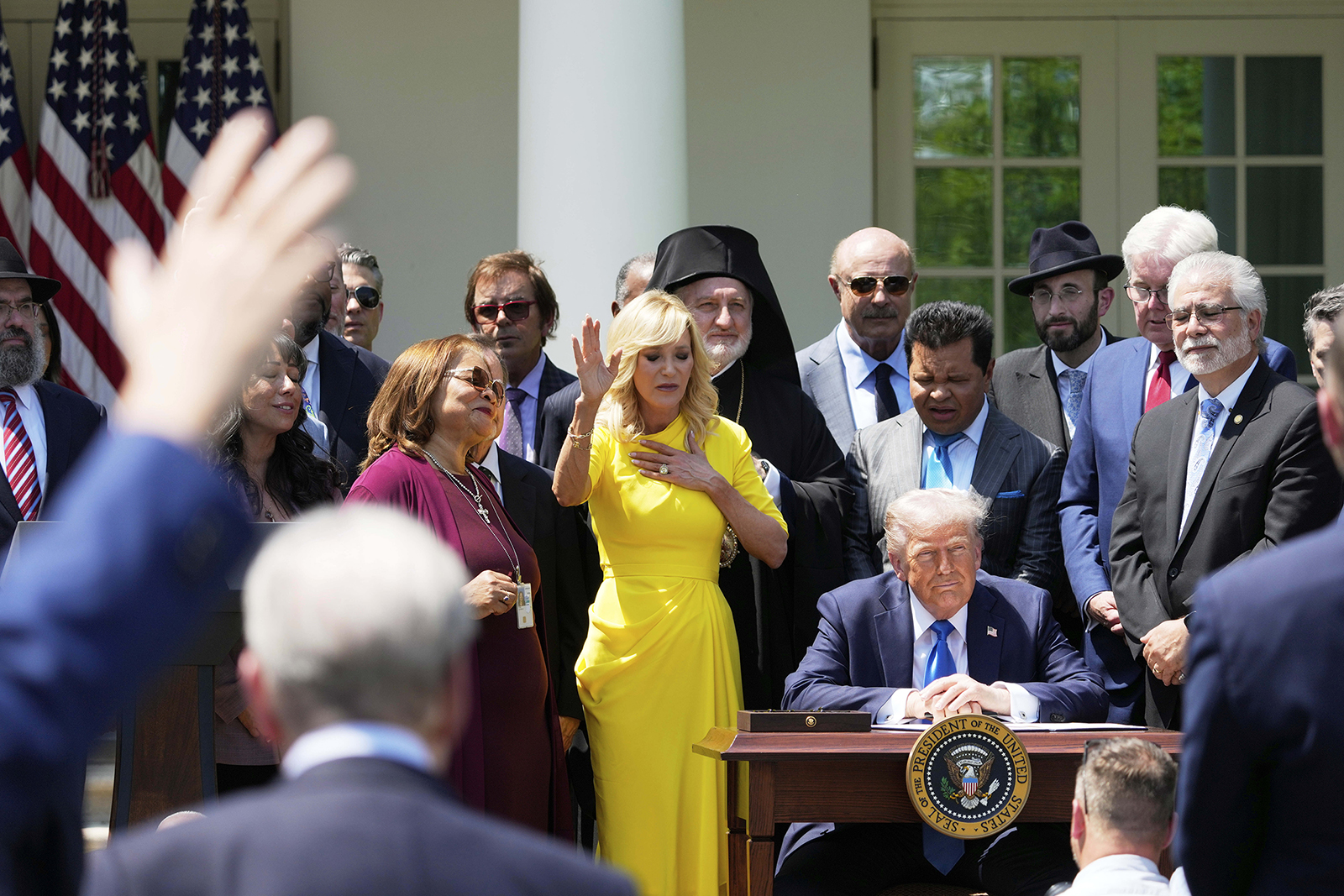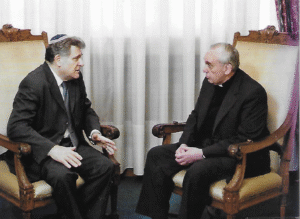 On May 2, President Donald Trump signed two executive orders concerning religion in America. One created the Religious Liberty Commission, led by Chair Dan Patrick, the Republican lieutenant governor of Texas, and Vice Chair Dr. Ben Carson, a one-time Republican presidential candidate and former Trump administration official. Despite its broad title, both the leadership and the membership of this commission suggests that it is not actually concerned with the liberty of all religions:
On May 2, President Donald Trump signed two executive orders concerning religion in America. One created the Religious Liberty Commission, led by Chair Dan Patrick, the Republican lieutenant governor of Texas, and Vice Chair Dr. Ben Carson, a one-time Republican presidential candidate and former Trump administration official. Despite its broad title, both the leadership and the membership of this commission suggests that it is not actually concerned with the liberty of all religions:
Among the commission’s members are Trump allies, including White House faith adviser Paula White, talk show host and author Eric Metaxas and evangelist Franklin Graham, head of Samaritan’s Purse, along with other faith leaders like Cardinal Timothy Dolan of New York, Minnesota Bishop Robert Barron of the popular Word on Fire media ministry, Rabbi Meir Soloveichik of Congregation Shearith Israel in New York and talk show host Phil McGraw.
Apart from Cardinal Dolan and Rabbi Soloveichik, the commission is dominated by Evangelical Protestant Christians. Its prevailing ethos is clear from “Dr. Phil” MacGraw’s comment at the ceremony establishing the commission: “Mr. President, I can’t tell you, first off, how proud I am to see religion coming back to the White House. God bless you. God bless you.” Although President Joe Biden was a pious and visibly practicing Roman Catholic Christian, his was apparently not the right kind of religion, and he was evidently not the right sort of Christian.

Mr. Trump’s second executive order established a task force on “eradicating anti-Christian bias,” chaired by Attorney General Pamela Bondi and staffed by government officials including Secretary of State Marco Rubio and HHS Secretary Robert Kennedy. As Elizabeth Bruenig writes in The Atlantic, this means the government will now rule on what exactly constitutes authentic Christian belief and practice—not a straightforward determination, she argues, nor one that should be entrusted to the administration.
The executive order creating the task force cites a multitude of examples of what the Trump administration considers to be unacceptable discrimination against Christians, including Biden-era prosecutions of Christian anti-abortion protesters under the Freedom to Access Clinic Entrances Act, the promulgation of a (later retracted) FBI memo referring to radical traditionalist Christians as a potential domestic-terrorism threat, and the designation of Easter Sunday of 2024 as the year’s Transgender Day of Visibility. Conservative Christians may generally agree with Trump’s characterization of those episodes. But determining the authentically Christian perspective on an issue is not always a simple task.”
For example, the International Transgender Day of Visibility has since its founding in 2009 been on March 31, while Easter is a movable feast whose date is determined by complex calculations (on which Eastern and Western Christians differ). So, the fact that for Roman Catholic and Protestant Christians Easter in 2024 fell on March 31 has nothing to do with “anti-Christian bias.”
Bruenig argues that the task force (and the Religious Liberty Commission, I would suggest) is actually part of “a broader project to recapture political and cultural ground that Christianity has lost over the past several decades.”
If the task force’s mandate of mere fairness is essentially a pretext for persecuting perceived enemies of the faith, then its real purpose is to restore this past vision of American Christian dominance.
Perhaps that’s the irony of this new task force: Nobody appears to view Christianity as just another interest group as much as Donald Trump. . . . Christians should as a rule be skeptical of versions of the faith that are informed overly much by partisan politics, which always have something other than Jesus at their core.

As a Bible Guy, I tend to think in biblical terms. So reflecting on religious liberty and diversity brought to my mind a crucial incident in the biblical account of Moses’ life and ministry involving Moses’ father-in-law Jethro, a Midianite priest (and not a Jew), detailed in Exodus 18.
That he is called “Jethro” here (Exod 18:1, 2, 5, 6, 9, 10, 12; cf. Exod 3:1; 4:18) is suggestive: southern traditions call him Reuel (Exod 2:18) or Hobab (Jdg 4:11; Num 10:29, which says that Hobab was the son of Reuel, may represent an attempt to consolidate these traditions). Most likely, Exodus 18 belongs to the old northern traditions in the Pentateuch–often called E because of their preference for the Divine title ‘elohim (“God”) rather than the personal Name Yhwh (typically rendered as “the LORD,” in all caps). While these traditions do use Yhwh after the Name is revealed to Moses in Exodus 3:9-15, they remain reluctant to use it too frequently. So, while the Divine is referred to throughout this chapter as “God” (Exod 18:1a, 4, 5, 12 [twice], 15, 16, 19 [three times], 21, 23), in two places (Exodus 18:1 and 8-11) “the LORD” is used, as these verses recall Yhwh delivering Israel from Egypt–calling the Name particularly to mind.
So, when Moses tells Jethro of the LORD’s deliverance of Israel from Pharaoh, and from the hardships they have faced so far in the wilderness, Jethro rejoices, and declares: “Now I know that the LORD is greater than all gods [kol–ha’elohim], because he delivered the people from the Egyptians, when they dealt arrogantly with them” (Exod 18:11 NRSVue). Note that the Name is essential in this verse, as it distinguishes Israel’s God Yhwh from all other gods (‘elohim).
Then, the Midianite priest offers a sacrifice to the LORD, followed by a sacred meal in which Moses’ brother, the priest Aaron, also participates (Exod 18:12). Many early Jewish and Christian interpretations wrestle with this inclusion, and can only accept Jethro’s role by seeing his confession in Exod 18:10-11 as a religious conversion. In Targum Pseudo-Jonathan of Exod 18:6, Jethro tells Moses that he has come in order to convert (Aramaic l’tgyyr’). Other traditional Jewish sources also regard this as a conversion story: for example, Exod Rab 1:32; Tankha Buber Yitro, 5. Among Christian interpreters, Cyril of Alexandria and the Venerable Bede also see this scene as Jethro’s conversion (cited by Brevard Childs, Exodus, OTL [Louisville: Westminster, 1974], 332).
On the other hand, Mekhilta DeRabbi Yishmael, Tractate Amalek 3 compares this meal to one served by the great Rabbi Gamaliel:
What you are doing isn’t good. You will end up totally wearing yourself out, both you and these people who are with you. The work is too difficult for you. You can’t do it alone.
While other northern traditions highly exalt Moses (e.g., Num 12:6-8; Deut 5:1-5), this chapter is remarkable for its very human portrayal of Israel’s liberator, who accepts the wise counsel of his foreign wife’s father to share the burden of leadership.
Jewish historian Josephus notes that in so doing, Moses did not “conceal the invention of this method; nor pretend to it himself: but informed the multitude who it was that invented it. Nay he has named Raguel [alternate spelling of Reuel {cf. Num 10:29, KJV}; i.e., Jethro] in the Books he wrote, as the person who invented this ordering of the people” (Ant III. 4.2): giving due praise to a Gentile!

So too, St. John Chrysostom wrote,
For nothing was more humble than he, who being the leader of so great a people, and having overwhelmed in the sea the king and the host of all the Egyptians, as if they had been flies, and having wrought so many wonders both in Egypt and by the Red Sea and in the wilderness, and received such high testimony, yet felt exactly as if he had been an ordinary person. As a son-in-law he was humbler than his father-in-law; Moses took advice from him and was not indignant (“Homilies on 1 Corinthians 1.4”).
Likewise, Augustine wrote:
Moses very prudently and humbly yielded to the advice of his father-in-law, foreigner though he was. . . For he realized that from whatever intellect right counsel proceeded, it should be attribute not to him who conceived it but to the One who is truth, the immutable God (On Christian Teaching, Prologue 7).
In 1995, Argentinian friends Rabbi Abraham Skorka and then-Cardinal Jorge Mario Bergoglio (who would become Pope Francis) decided to publish their conversations on matters philosophical, political, and theological. Those conversations, translated from Spanish by Alejandro Bermudez and Howard Goodman, became On Heaven and Earth (New York: Image, 2013). In the chapter titled “On Religions,” Rabbi Skorka asks,
How can it be that there are people who speak poorly of others that practice a different religion if those others are sincere and are trying to help people get closer to G_d? Those that present themselves as knowing the absolute truth, judging everyone else and their actions with condescension, have gotten used to the frequent practice of this disgraceful pagan principle (On Heaven and Earth, 19-20).
Pope Francis warns against “a divinization of power” that “emerges in the name of God. Those who do it are people who construct themselves as God.” He reflects,
The second commandment [cf. Matthew 22:34-40; Mark 12:28-34; Luke 10:25-28] proposes that you love your neighbor as yourself. No believer can limit the faith to himself, his clan, his family, or his city. A believer is essentially someone who goes into an encounter with other believers, or non-believers, to give them a hand (On Heaven and Earth, 21).
The example of Moses’ embrace of Jethro, and willingness to learn from him despite their differences in religion and ethnicity, stands as a biblical endorsement of conversations like those between the rabbi and the Pope. Perhaps, friends, we need not insist that our perspective on truth be privileged to the exclusion of all others. Rather than being constantly on the lookout for “anti-Christian bias,” may we learn to listen for truth from every source God brings to our attention.
